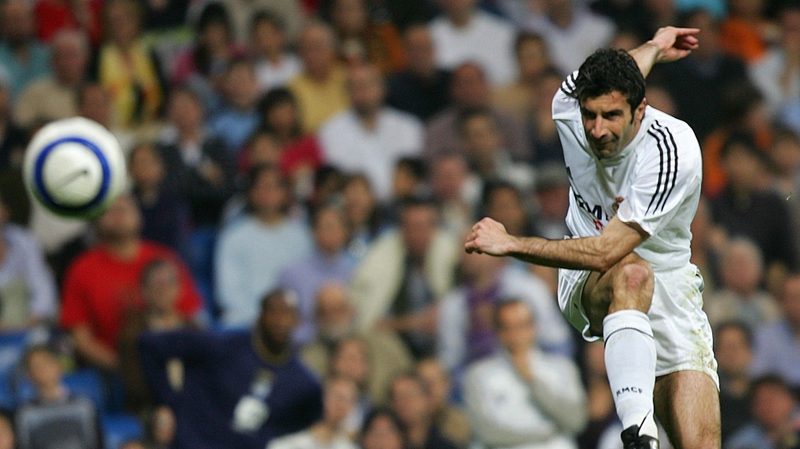
Despite his incredible ability with the ball at his feet, Portuguese football legend Luis Figo will always be remembered for leaving Barcelona to join their eternal rivals Real Madrid.
Figo, who was the Barcelona skipper who went from a revered hero in Catalunya to the region’s biggest enemy following that move. But why did Figo agree to the controversial move? We explain:
A promise to Perez
During the late nineties, Real Madrid were in terrific shape on the field.
The club had won two UEFA Champions League titles in three seasons between 1998 and 2000 and club president Lorenzo Sanz was confident that the team’s on-field exploits would be enough to get him re-elected in the upcoming election. But competing for the position was the chairman of Madrid-based construction company Grupo ACS and a lifelong supporter of Los Blancos, Florentino Perez.
The then-53-year-old businessman knew it would take something out of the left-field for him to beat Sanz in the election given how well Madrid had done under his tutelage, so he forged a plan that would shake the dynamic of Spanish football to its core.

Perez approached Figo’s agent Jose Viega, who had publicly claimed that Lazio were willing to trigger his client’s 40 million pound buyout clause and take him to the Italian capital. Perez offered Viega a pre-contract for Figo that stated that in the event that the 53-year-old becomes the new president of Real Madrid, the Portuguese superstar would have to sign for the Los Blancos, however, if he didn’t, Figo can keep the amount that Perez offered him to sign the agreement.
Knowing that Perez barely stood a chance to win the election, Viega convinced Figo to sign the agreement. However, the contract also stated that if Perez became president and Figo then refused to sign for Real, the Portugal captain would have to pay 19 million pounds to the club from the capital for breach of contract.
During his presidential bid, Perez promised members of the board that among his first acts as president, he would sign Figo from Barcelona and in the event that he failed to do so, he would let all members of the board watch games at the Santiago Bernabeu for free. Sanz, the current president, laughed off Perez’s outlandish promises, but the board members were enticed by what was promised to them and thus, elected Perez into power on July 16, 2000.
This put Figo in a pickle.
Not only did he not expect Perez to win, but he also never factored that he would have to pay 19 million pounds, money that he didn’t have, to stay at Barcelona. Figo approached newly appointed Barcelona president Joan Gaspart to help him escape this muddle.
Upon learning of the situation, Gaspart refused to pay 19 million pounds to keep a player that already had a contract with the club, especially to Barcelona’s eternal rivals Real Madrid. With the club refusing to comply with Figo’s demands, the Portuguese superstar decided, reluctantly, to give Perez the go-ahead and pay his release clause.
Perez, who had played his hand perfectly, deposited 40 million pounds, a world record fees at the time, and signed Barcelona’s captain as one of his first acts in the top seat at Real Madrid.
The 53-year-old delivered on his promise. And Figo delivered on the field. In his five years at the club, Figo won the La Liga title and the Spanish Super Cup twice, the Intercontinental Cup and the Club World Cup once and the 2002 UEFA Champions League crown.

But perhaps what hurt Barcelona the most was Figo lifting the 2000 Ballon d’Or in the white of Real Madrid, an award he won largely for his incredible 1999-2000 season with Barcelona. In the second El Classico at Camp Nou, Figo, now dubbed ‘Pigo’ by the Barcelona faithful, hurled projectiles at the Portuguese player and booed every time he touched the ball. They also threw a pig’s head at Figo to show what they thought of the perceived betrayal by the player they once worshipped.
But to those in white, it didn’t matter. Because while Madrid found success on the pitch, Barcelona crumbled. They failed to win a single trophy from 2000 to 2004, before finally winning the La Liga in 2004-05, Figo’s last season in Spanish football.
Under manager Frank Rijkaard and led by Brazilian sensation Ronaldinho, Barcelona once again found their footing among Europe’s elites. But that half a decade hurt them to no end.
A bizarre pre-contract agreement, an agent’s greed and a businessman’s cunning plan bore fruit to one of the most controversial transfers in the history of football.
Feature image courtesy: AFP / Pierre-Philippe Marcou / Phillip Desmazes























